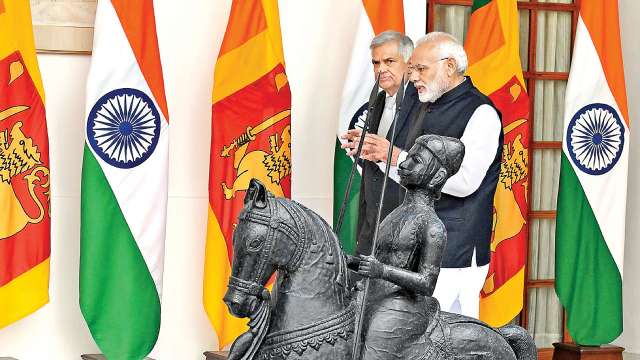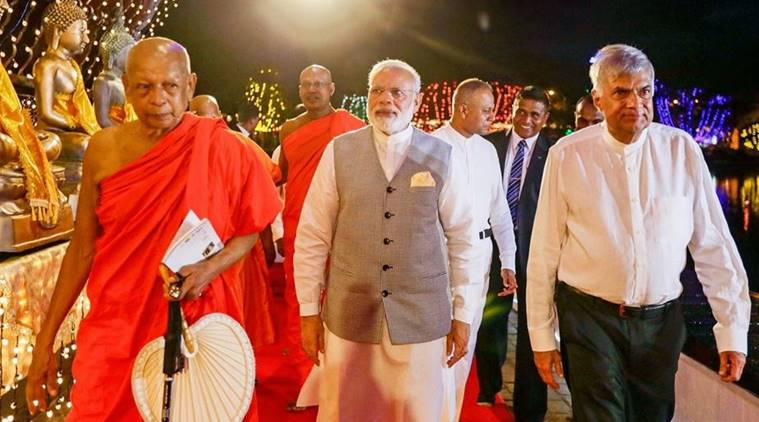PM Modi Presses Sri Lanka President on 13th Amendment Implementation: India’s Concerns Explained

PM Modi Presses Sri Lanka President on 13th Amendment Implementation: India’s Concerns Explained
Sri Lanka President, Ranil Wickremesinghe, conducted an all-party meeting on Wednesday (July 26) to address the matter of Tamil reconciliation and welfare in the country. This meeting comes shortly after he visits India, during which Prime Minister Narendra Modi emphasized the importance of ensuring a life of dignity for the Tamil community in Sri Lanka.
During President Ranil Wickremesinghe’s recent visit to India, Prime Minister Narendra Modi expressed hope and expectation that the Sri Lankan government would be committed to implementing the 13th Amendment to Sri Lanka’s constitution. This amendment stems from the Indo-Sri Lanka Accord of 1987, which aimed to address the longstanding issue of Tamil reconciliation and devolution of power in Sri Lanka.
The 13th Amendment was introduced to establish provincial councils in Sri Lanka to give greater autonomy and decision-making powers to the regions, particularly in areas where the Tamil community is a significant presence. The implementation of the amendment is considered a crucial step toward ensuring a more inclusive and equitable governance system in the country.
The 13th Amendment to the Constitution of Sri Lanka was introduced in 1987 as part of the Indo-Sri Lanka Accord, aimed at addressing the ethnic conflict in the country, particularly the concerns of the Tamil minority. The amendment established provincial councils to grant regional governance and devolved powers to handle specific areas like education and health.

India played a significant role in brokering the accord, with then-Prime Minister Rajiv Gandhi being instrumental in its negotiation. India’s involvement was motivated by regional stability, humanitarian concerns for the Tamil community, and a proactive diplomatic approach to promote peace and reconciliation. However, the full implementation of the 13th Amendment has faced challenges due to political opposition, lack of consensus among parties, and security concerns, leading to delays in its complete execution.
Despite efforts to implement the 13th Amendment, progress has been slow. Last week, President Ranil Wickremesinghe expressed the commitment to its implementation, subject to agreement among political parties in Parliament. He emphasized the importance of reaching a consensus through talks involving all political parties, recognizing that the full execution of the 13th Amendment is crucial for the entire country. The issue remains complex and sensitive in Sri Lanka’s political landscape, making it a work in progress to find a comprehensive solution to the ethnic conflict and foster a system of equitable governance and representation in the nation.
The Indo-Sri Lanka Accord of 1987
The 13th Amendment to Sri Lanka’s constitution was introduced following the signing of the Indo-Sri Lanka Accord on July 29, 1987, in Colombo. The accord was a significant agreement brokered between Indian Prime Minister Rajiv Gandhi and Sri Lankan President J. R. Jayewardene. It aimed to address the ethnic conflict in Sri Lanka and find a resolution to the grievances of the Tamil minority community.
Sri Lanka’s 1978 constitution established a unitary form of government, which concentrated most powers in the central government. The Tamil minority in Sri Lanka was mainly concentrated in the Northern and Eastern provinces and had longstanding grievances regarding their rights and autonomy within the country.
The struggle for greater rights and autonomy escalated into a brutal civil war between the Liberation Tigers of Tamil Eelam (LTTE), a separatist militant organization, and the Sri Lankan government. The conflict lasted for several decades and resulted in a significant loss of life and widespread destruction.

To find a constitutional solution to the civil war and address the demands of the Tamil minority, the Indo-Sri Lanka Accord was signed in 1987 between the governments of India and Sri Lanka. The Accord aimed to devolve some powers from the central government to regional administrations, thereby providing a degree of autonomy to the country’s nine provinces, including the predominantly Tamil Northern and Eastern provinces.
The Indo-Sri Lanka Accord of 1987 had various clauses in addition to the devolution of power. It aimed to address multiple aspects of the conflict and political situation in Sri Lanka during that time. One significant provision was the adoption of Tamil and English as official languages alongside Sinhala, recognizing the linguistic diversity of the country. The Accord also stipulated the lifting of the state of emergency in the Eastern and Northern Provinces of Sri Lanka by August 15, 1987, which had been in effect for an extended period due to the civil war and security concerns.
Furthermore, the Accord mandated the surrender of arms by all militant groups, including the Liberation Tigers of Tamil Eelam (LTTE), to ensure a peaceful resolution to the conflict. Another important aspect was the granting of general amnesty to political and other prisoners held in custody under The Prevention of Terrorism Act and other emergency laws, seeking to address human rights issues and promote reconciliation.
What about the 13th Amendment’s implementation?
After the implementation of the 13th Amendment in Sri Lanka, provinces throughout the country were granted greater autonomy, although the Northern and Eastern regions were the primary focus due to their history of conflict. However, the Central government retained control over crucial areas like land and police powers. The elected provincial councils were empowered to legislate on specific subjects such as education, health, agriculture, and transportation.

Despite the amendment’s intent to address the grievances of minority communities and promote power-sharing, the devolution of power was never fully realized, leading to discontent among some groups who felt it did not go far enough. On the other hand, hardline nationalists, particularly Sinhala nationalists, opposed the amendment, viewing it as an external imposition that undermined the authority of the Central government and the unitary nature of the state. Consequently, the issue of devolution and power-sharing in Sri Lanka remains a complex and contentious matter.
The incomplete implementation of devolution and the uneven distribution of its benefits have been persistent issues in Sri Lanka. The country’s complex ethnic, political, and historical landscape has made finding a comprehensive and lasting solution challenging. While some advocate for more extensive devolution to address the demands of marginalized communities, others fear further erosion of the Central government’s authority.
The lack of progress has contributed to ongoing tensions and debates over power-sharing and regional autonomy, underscoring the importance of finding a balanced and inclusive approach to governance that addresses the concerns of all stakeholders.
Elections for the Eastern Provincial Council took place on May 10, 2008, allowing the people in that region to exercise their right to elect representatives. However, the Northern province remained under the control of the central government until September 21, 2013, when elections for the council were finally held after an extended period of governance from Colombo.

This discrepancy in holding elections meant that the Sinhala provinces experienced regular electoral processes, enabling political parties in those regions to benefit from grassroots politics and gain valuable experience in governance. On the contrary, the North and Eastern regions had limited opportunities for self-governance and were subject to centralized control for an extended time.
Since 2014, there has been a delay in conducting provincial elections across Sri Lanka. This delay is primarily due to Parliament’s failure to amend a 2017 Act aimed at reforming the election process. The proposed amendment seeks to introduce a hybrid system that combines the first-past-the-post and proportional representation methods, departing from the current system solely based on proportional representation.
The uncertainty surrounding the electoral reform has led to a prolonged postponement of provincial elections, creating a situation where the people in the provinces are still awaiting the chance to elect their representatives and actively participate in the democratic process at the regional level.




